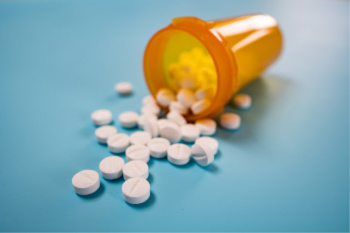
People with a certain form of depression might benefit from a drug called lurasidone, which has fewer sexual side effects than other depression medications, according to a recent clinical trial.
Depression is linked several sexual difficulties, including low desire, poor arousal, and trouble reaching orgasm. Experts estimate that up to 85% of people with untreated depression experience some degree of sexual dysfunction.
Unfortunately, medications used to treat depression, such as selective serotonin reuptake inhibitors (SSRIs), have sexual side effects that can make things worse. Many people stop taking their medicine because of these side effects.
The drug lurasidone is classified as an atypical antipsychotic drug. It is used to treat mental health conditions like schizophrenia, bipolar disorder, and depression.
The clinical trial focused on a group of 209 people who had major depressive disorder, which can be severe. In addition to depression, the participants had subthreshold hypomanic symptoms. (Sometimes, doctors refer to these symptoms as “mixed features.”) This means that they had symptoms of mania, such as distractedness, little need for sleep, or being more talkative. However, these manic symptoms were not severe enough to interfere with the participants’ everyday lives.
For the trial, 109 people took 20 to 60 mg of lurasidone every day. The remaining 100 people took a placebo containing no medication. At the start of the study, the participants completed questionnaires to assess their depression symptoms and sexual function. Six weeks later, they filled out the questionnaires again, so the researchers could follow their progress.
Overall, the people in the treatment group had better sexual function at the end of the study period compared to those in the placebo group. Roughly 2% of the lurasidone group saw their sexual function go from normal to abnormal ranges. In the placebo group, the rate was just over 4%. Also, the amount of medication taken did not appear to affect sexual function.
None of the patients taking lurasidone reported any treatment-emergent adverse events that affected sexuality. In other words, none of them had sexual problems related to the medication.
The authors recommended further research to see whether trials of lurasidone in people with other types of mental health disorders might have similar results.
The findings were published in the September/October 2018 edition of the Journal of Clinical Psychiatry.
Resources
The Journal of Clinical Psychiatry
Clayton, Anita H., MD, et al.
“Effect of Lurasidone on Sexual Function in Major Depressive Disorder Patients With Subthreshold Hypomanic Symptoms (Mixed Features): Results From a Placebo-Controlled Trial”
(Full-text. September/October 2018)
https://www.psychiatrist.com/JCP/article/Pages/2018/v79/18m12132.aspx
MedlinePlus
“Lurasidone”
(Last revised: April 15, 2018)
https://medlineplus.gov/druginfo/meds/a611016.html
PsychCentral
Bressert, Steve, Ph.D.
“Hypomanic Episode Symptoms”
(Last updated: February 23, 2018)
https://psychcentral.com/disorders/hypomanic-episode-symptoms/
Psychiatry Advisor
Pond, Emily
“Lurasidone Effective for Treatment of Depression, Not Associated With Sexual Dysfunction”
(August 30, 2018)
https://www.psychiatryadvisor.com/depressive-disorder/lurasidone-effective-for-treatment-of-depression-not-associated-with-sexual-dysfunction/article/792315/
You may also be interested in...
Other Popular Articles

What Is Jelqing, and Does It Actually Work?
The term “jelqing” refers to a set of penis stretching exercises that some believe can make the penis bigger. Although the practice has gained attention and popularity in blogs and internet forums in recent years, there is no scientific evidence that it is an effective way to permanently increase the size of one’s penis. In fact, in some cases, jelqing may actually cause damage to the penis, so it is a good idea to get all the facts before setting off to try it.

What Is Sensate Focus and How Does It Work?
Sensate focus is a technique used to improve intimacy and communication between partners around sex, reduce sexual performance anxiety, and shift away from ingrained, goal-oriented sexual patterns that may not be serving a couple.

What Is the Average Penis Size?
If you have ever wondered how your penis compares to others in terms of size, you are not alone. Many men are curious to know how their penises stack up compared to the average. Unfortunately, general curiosity can sometimes give way to full-on obsession and anxiety about penis size. This can be an unhealthy and often unnecessary fixation, especially because most men who think their penises are too small have perfectly normal-sized penises.

Can Sex Reduce Menstrual Cramps?
The SMSNA periodically receives and publishes ‘guest editorials.’ The current article was submitted by Mia Barnes, a freelance writer and researcher who specializes in women's health, wellness, and healthy living. She is the Founder and Editor-in-Chief of Body+Mind Magazine.
Having sex while you experience menstrual cramps is healthy and can provide significant benefits. While it might not be the first activity that comes to mind when your PMS or period cramping begins, many people enjoy sex to reduce menstrual cramps, experience increased pleasure and benefit from other advantages. Learn more about having sex while menstrual cramps are happening and how it can help your body.

What Is Edging and Why Do People Do It?
Edging is the practice of stopping sexual stimulation before reaching orgasm to prolong a sexual experience. The term stems from the concept of approaching the metaphorical “edge” of orgasm but stopping before going over the edge.

The Sex-Positivity Movement: What it Means to Be Sex-Positive
You may have heard references to “being sex-positive” or “the sex-positivity movement” in popular culture. Various celebrities have brought attention to this movement by speaking out about their beliefs and personal experiences regarding sexuality, sexual health, body positivity, “slut-shaming,” and sexual assault.

